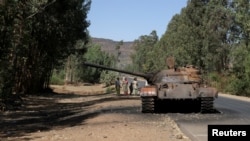G-7 foreign ministers have called for a “swift, unconditional and verifiable” withdrawal of Eritrean troops from Ethiopia’s northern Tigray region.
The ministers of the world’s leading economies gathered Friday for an annual meeting in Berlin and issued a statement following a recent announcement from Ethiopia’s Prime Minister Abiy Ahmed that he has spoken to Eritrea’s President Isaias Afwerki who has agreed to withdraw Eritrean forces from the Tigray region.
“In our March 26, 2021 discussions with President Isaias Afwerki during my visit to Asmara, the government of Eritrea has agreed to withdraw its forces out of the Ethiopian border,” Abiy said in a statement posted on his Twitter account.
G-7 ministers urged all parties to exercise “utmost restraint, ensure the protection of civilians and respect human rights and international law.”
The ministers of Britain, Canada, France, Germany, Italy, Japan, and the United States, and the high representative of the European Union called for “the end of violence and the establishment of a clear, inclusive political process that is acceptable to all Ethiopians, including those in Tigray.”
The process must lead “to credible elections and a wider national reconciliation,” the statement added.
The ministers also expressed deep concern about recent reports highlighting “human rights violations and abuses, and violations of international humanitarian law in Tigray.”
Abiy launched what he termed a “law and order operation” in the Tigray region in November and ordered Ethiopia’s federal military to detain and disarm leaders of the Tigray People’s Liberation Front (TPLF), saying that the group was responsible for inciting attacks on federal army camps. The TPLF is a political group with an armed wing vowing to continue fighting against the federal government.
Both countries denied that Eritrean troops had entered the Tigray region for several months, contrary to accounts from diplomats, aid workers, residents, and even some Ethiopian military officials.
The armed conflict in Tigray has resulted in thousands of deaths, internally displaced thousands more. Hundreds of thousands have also been forced to flee to neighboring Sudan. The region of more than 5 million people is facing shortages of food, water and medicine, according to the U.N.







